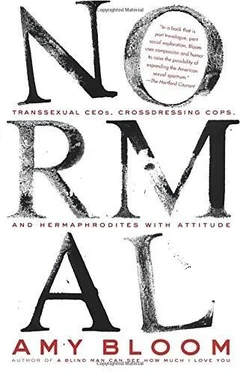Two crossdressers lounge near the table, although their body language is so coiled and fraught that it is no more like lounging than tae kwon do. They are both thin to the point of disturbance — the emaciated look is almost as common as the matronly one. Other men solve the waistline problem with the severe corseting one sees only in fetish catalogues, Gaultier shows, and Victorian porn, and the rest of them wear large dresses. These two are in tight cocktail dresses, one black spandex, one electric-blue satin with three tiers of flounces from hip to mid-thigh. Awkward and odd in three-inch silk-strapped sandals at two in the afternoon, they pace next to these cheerful dumpling ladies. They don’t look so much like men in drag as like people of indeterminate gender with whom something has gone wrong. And they’re not happy to see me, either. Throughout the weekend, I get cold-shouldered by the men who find my presence as neither wife nor support staff burdensome, the ones who make it clear that they have to contend with real women (“g.g.’s” is the common, faintly hostile term: genetic gals) plenty the rest of the year. I’m welcomed by a few guys who are happy with their crossdressing, or happy to talk about it, and I’m asked out by two shy, determined men, an accountant and a firefighter, whose previous relationships foundered on the revelation of the crossdressing and who would like to find a nice woman who will accept it, even embrace it.
During cocktail hour I’m approached by Kris and her husband, Leroy, a middle-aged crossdresser. I learn that they are newly married. When he goes off to get a drink, she suggests in a soft Iowa voice that we talk more, later. Her pile of stiff blond curls is not unlike Leroy’s. She finishes her drink and looks at me with the sad, amused gaze of a woman who does not kid herself.
“Well,” she says, “I put an ad on the Internet for a man in touch with his feminine side, didn’t I? Of course, I had in mind a communicator, a romantic, a listener … and apparently Leroy read it a certain way. There are so many things you can’t say. Most of the wives are not as open as I am. They don’t want to say to themselves, ‘You’re nothing but a people-pleaser, you’ve been one all your life.’ You see yourself as a failure if you can’t accept this. The wives don’t tell their husbands, they can’t tell him because they don’t want to hurt him and they don’t want to lose him, so they walk a fine line of the truth or they hang on silently and hope his feelings change. Crossdressing is the ultimate form of worship, that’s what the men say, and they say they want to develop all those feminine aspects, but I don’t feel worshiped. My femaleness is not something Leroy adores — it’s his femaleness that this is all about. This gift is supposed to be the integration of the feminine side — more nurturing, more open — and the sharing of feminine things is very important to Leroy, but he’s said that if he can’t pass, he’ll quit. So I could make him quit, I guess, by telling him the truth, and yet I can’t tell him the truth. He’d feel terrible.”
I suggest to Kris that she feels pretty terrible already.
“I know. I’ve been thinking of not coming to these things anymore. When he crossdresses, I just don’t have a husband. It’s not like Dixie and Rebecca, who just seem themselves all the time. He always acts like her husband, not like a nervous girlfriend.”
Dixie and Rebecca are standing across the room, both of them in black lace cocktail dresses, Rebecca’s floor-length and very Scarlett O’Hara, his mid-calf and rather 1930s, with a dropped waist. Just in case you didn’t see him, at six feet, four inches and about two hundred and thirty pounds, he wears a large black polished straw hat with velvet band and dyed black feathers. Dixie and his very pretty wife seem to be having a hell of a time.
“Hey, little lady.” Dixie cocks his finger at me John Wayne-style and beckons me over. He is explaining to several crossdressers that if they’re stopped by a state trooper they should not try to impersonate a woman or lie. He should know: he’s been stopping cars in Alabama for twenty-five years. He plays both roles for us, the menacing trooper and the wetting-his-pants crossdresser hoping to get out of this without newspaper headlines, a beating, or a divorce. The other men laugh, seeming to appreciate his help, and the wives sneak looks at Rebecca, who is holding his hand and twisting around one of his big arms in the historic manner of Southern belles. They are as happy as any other deeply compatible couple, the kind of couple whose pleasure in each other makes them even more golden to the rest of us. Later on, she sits in his lap in the cocktail lounge, and when a stray businessman asks Dixie if he, Dixie, thinks he’s a woman, Dixie growls, “I’m a guy in a dress. Of course I don’t think I’m a woman. But how about this, pal, we’ll ask your wife and my wife who’s happier. The winner buys a round.” The man backs off and lifts his glass in Dixie’s direction. Dixie laughs and kisses Rebecca—“Well, there you go. I’ll buy anyway”—and orders drinks for the bartender, the businessman, and me.
Rebecca says, “You know, Dixie’s just a people person.” (She uses his femme name and his real name interchangeably, and he seems to care as little as she does.) “He goes to the bakery for a loaf of bread, and when he comes back he’s got five new friends and four of them are staying for dinner. That’s just the way he is, and I guess the dressing up goes with that. Of course I don’t mind. Why should I? It’s fun for both of us. It’s something different, and I’m glad about that. I don’t want to just play bridge — I already had a boring marriage.”
Rebecca understands that some wives do mind, and she thinks that’s too bad.
“I wouldn’t have married him if I minded. It’s fun, we buy some fun clothes, and he’s always himself. I mean, just look.” Dixie is winking at our smiling waitress and setting up a bridge game for later that night.
When the day of the Miss Fall Harvest Pageant arrives, Jim Bridges is busier than a one-armed paperhanger. He is doing makeover after makeover, on his feet from nine A.M. until eight P.M., when the pageant begins: Contemporary Dress, then Talent, then Evening Wear. As I’m sitting on the bed in Bridges’s suite turned beauty parlor, Mimi comes by, in undershirt, jeans, and cowboy boots, as Mike. I met Mimi the first night of the conference. He told me he was not going to be in the pageant because he didn’t need to be: Mimi’s talent was simply in being. That night Mimi was wearing a sort of Heidi the Vampire Slayer outfit — platinum shag, tight black latex corset, suit with arm cuffs, boots, choke collar — and having a fabulous time, flirting, strutting, glad-handing through the crowd, without the restraint or anxiety I see in lots of the men. But now Mike is wandering in and out of Bridges’s suite, his powerful shoulders slumped, a slight potbelly over his jeans, distressed that Jim can’t fit him in so that he will look “absolutely spectacular” tonight.
Jim cracks jokes and soothes the anxious, perspiring men. The suite has the whiff of a locker room without any sense of team. Each of these men is on his own journey, and although they are kind to one another most of the time, and encouraging (“You go, girl!” “That wig is really good!”), there is no feeling at all that they are in this together or that it is fun.
Jim says, “I want you all to look fabulous. Maybe someone’ll get lucky tonight.” There is a round of masculine chuckles, and one man says, “I’m all for that!” I ask, “Who would you all want to get lucky with?” and there is complete silence. Jim lifts one eyebrow but says nothing. These men are his bread and butter now, and if he thinks that some of them have a more ambivalent relationship to their sexuality than they acknowledge, he certainly isn’t going to offend them by saying so.
Читать дальше












